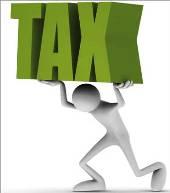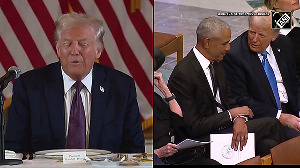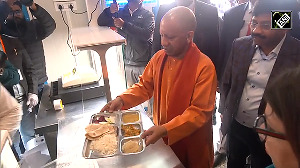West Bengal's politicians have starved their state of revenue, and thus crippled its ability to serve its citizens, writes Devesh Kapur  A fundamental tenet of state power is its capacity to extract taxes.
A fundamental tenet of state power is its capacity to extract taxes.
Very high tax rates can make states turn from extractive to rapacious, and in the process killing the goose that lays the golden egg.
There is, however, little doubt that in the absence of some equivalent of manna from heaven, a strong tax base is a sine qua non for a developmental state.
While the Indian Left has focused primarily on state expenditures -- their level and distribution -- lamenting the multiple evils of the 'neoliberal' monster, it has been uncharacteristically silent on the revenue side of public finance.
In no state is this more evident than in West Bengal, where the three-plus decades of Left front rule have been followed by a regime whose belief-system on revenues is hardly different.
The most recent report of the Reserve Bank of India on state finances released last week is revealing in this regard.
Unsurprisingly, when it comes to non-tax revenues, which are user charges on public services provided by the state, during the period 2004-08 West Bengal had the lowest share of revenue to gross state domestic product, and only Bihar was marginally lower in the most recent year, 2011-12.
More interestingly, West Bengal's share in central transfers has been no different from the all-India average across the 17 non-special category states and, indeed, in the most recent period, it is even marginally higher (5.7 per cent of GSDP, compared to the all-India average of 5.6 per cent).
For decades, the Left in Bengal kept up the drumbeat against discrimination by the Centre.
While that had undoubtedly been true in earlier decades, this has been much less the case after the onset of economic reforms.
But the most revealing data concern the ratio of own tax revenue to GSDP; in West Bengal it was just 4.5 per cent between 2004 and 2008 -- which placed the state among the bottom three states, with only Bihar (4.2 per cent) and Jharkhand (4.4 per cent) marginally lower.
By 2011-12, Bihar's own tax revenue to state domestic product had risen to 5.3 per cent and Jharkhand's to 5.7 per cent.
West Bengal's tax revenues, like its ruling politicians' beliefs, remained unchanged.
In contrast, Kerala, another state that has a strong Left tradition, has made much stronger efforts to raise taxes (higher than the all-India average).
Unsurprisingly, the weaknesses in revenues are mirrored in expenditures.
Development expenditure as a share of GSDP for West Bengal was the lowest (of the 17 non-special category states) in 2004-08, while even in social sector expenditures -- the one area usually favoured by Left governments -- West Bengal has been in the bottom third of Indian states, in a comparative context where the competition isn't exactly of Nordic stature.
But the most depressing performance is in capital outlays, which were barely a third of the all-India average (as a share of GSDP).
While they increased last year (as a share of GSDP), they were still barely half of the all-India average.
The pitiful levels of capital expenditures on the much-needed public infrastructure whether related to irrigation, transport or utilities hardly augur well for inclusive growth in the state.
As the 14th Finance Commission begins its work, West Bengal's dismal public finances offer an instructive lesson for India's fiscal future.
There is no better way to ensure that citizens are left to fend for themselves and face the full vicissitudes of market forces than to destroy a state's public finances.
The most ardent advocates of neoliberalism could never dream of rolling back the state in areas where it really mattered for ordinary citizens to the degree decades of fiscal mismanagement had done in many Indian states -- and at least as much as with the central government, whose reckless fiscal ways have even graver consequences.
In most Indian states, fiscal mismanagement has been perhaps less the result of ideological choices and more a consequence of what the late Albert Hirschman in his classic essay 'Exit, Voice and Loyalty' worried about 'an oppression of the weak by the incompetent and an exploitation of the poor by the lazy, which is the more durable and stifling as it is both unambitious and escapable'.
The lesson of the Soviet Union is a sobering reminder that bankruptcy is not just a bracing shower; it means no shower, ever.
The writer is director of the Centre for the Advanced Study of India at the University of Pennsylvania










 © 2025
© 2025